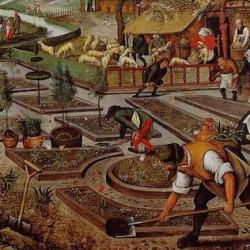Modernity, especially as theorized in modern economics, treats work as “instrumental to the acquisition of goods” (Stephen Marglin, The Dismal Science, 44). Modernity “closes off thinking of hard work as something other than drudgery” (43).
As a counterpoint, Marglin calls attention to work in Amish communities: “In physical terms, there is little to distinguish the work that [Amish] women do today from what the hill-country women did in the 1930s, before electricity wrought its miracles. The Amish typically have indoor plumbing, so women do not need to carry water from a distant well, and hot water flows from the tap, but these innovations apart, washing and ironing are closer to the technology that made this labor so oppressive in the Texas hills two-thirds of a century ago than to the technology that mainstream America now utilizes” (43).
Yet Amish work isn’t drudgery, and Marglin wonders why not: “For one thing, Amish women, like Amish men, see themselves as doing God’s work. They value not only the product but the process. They value themselves through their work.” Besides, Amish women work “communally. Work is a social occasion” (43).
Marglin argues that “Economics reflects the negative valence attached to work by treating labor as simply the absence of leisure, unless it be particularly irksome, tedious, unhealthy, or physically exhausting, in which case it is assigned a penalty in the pleasure-pain calculus that is assumed to underlie the choices we make. Work is certainly not associated in the economist’s mind with community” (44).











